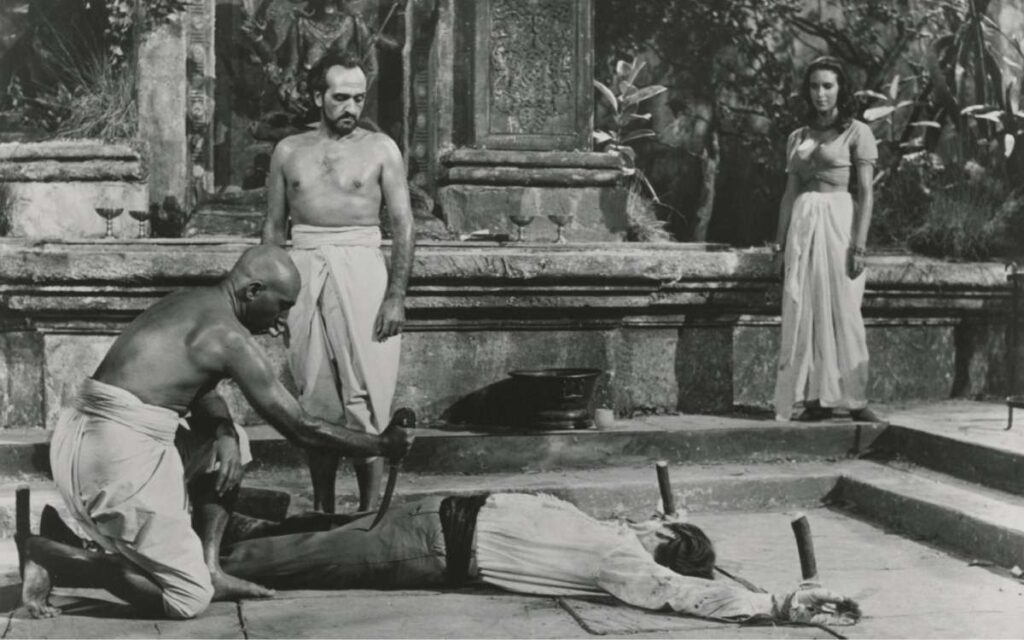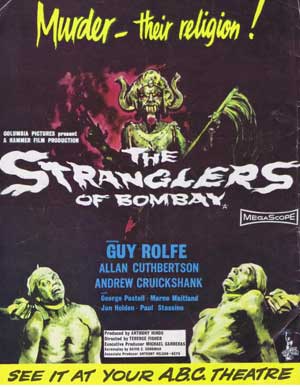The Stranglers of Bombay 1959 presents an interesting and little-addressed historical subject treated in several unusual ways, writes TERRY SHERWOOD

TITLE: The Stranglers of Bombay
YEAR RELEASED: 1959
DIRECTOR: Terence Fisher
CAST: Guy Rolfe, Allan Cuthbertson and Andrew Cruickshank
Review of The Stranglers of Bombay
Hammer Film Productions didn’t dedicate their efforts exclusively to horror. Adventure pictures featuring swashbuckling sailing ships, thrillers, comedies, science fiction and historical dramas. One release was The Stranglers of Bombay 1959, which like the later Rasputin, the Mad Monk 1966, was marketed like a horror film for which the studio was famous.
Stranglers in the Night
The setting is India in 1829 where the high priest of the Thuggee cult (George Pastell) delivers a sermon on the religious right of strangling those that defy or blasphemy the cult of Kali. A god whose acolytes no matter how young are trained in the art of torture and speedy garroting.
The film cuts to Colonel Henderson (Andrew Cruikshank), who is being chastised by his East India Company bosses for his inability to protect the caravan routes under his jurisdiction. Not only is the lucrative caravan cargo disappearing but also the wagons and the beasts that pull them all. What remains are dead strangled people numbering the hundreds. This has been going on for a while ever since Patel Shari (Marne Maitland) lost control. Captain Harry Lewis (Guy Rolfe) wants to devote his time and attention to solving the mystery of the vanishing caravans.
‘Watch Out For The Skin Deep’
Henderson seeking a more direct solution and who desires a promotion himself, passes Lewis over and assigns the task to newly-arrived Captain Christopher Connaught-Smith (Allan Cuthbertson). The newcomer knows nothing about the land or its people and considers knowing such things to be beneath him.
Lewis in the opposite and knows the people and their way of life.
Connaught-Smith’s idea of “investigation” is to sit around his headquarters in Bombay, beating up natives selected at random. Turns out the officer to whom the captain delegates the roughing-up duties, Lieutenant Silver (Paul Stassino), is himself an undercover Thug member of the cult.

Lewis eventually resigns his commission in disgust and takes it upon himself to crack the case as a private citizen.
Lewis has a personal connection to the Thuggee cult. His native servant, Ramdas (Tutte Lemkow), has a brother by the name of Gopal (David Spencer), who has recently disappeared. This is not because Gopal fell victim to the Thugs, but rather because he has dropped out of society to join the cult. Intimidation of Lewis’s family follows, and personal attacks and intrigue in the back streets of the village make up the film.
The Stranglers of Bombay 1959 acquired notoriety with the then-popular nude model Marie Devereaux playing a follower of Thugs. Devereux was seen in three Hammer Film Productions: she played a follower of goddess Kali in The Stranglers of Bombay 1959 and was one of Brides of Drqacula 1960; followed with The Pirates of Blood River 1962 . In a precursor of what was termed ‘Hammer Glamour’, the censors of 1959 removed most of her close-ups as cleavage was considered in poor taste.
And The Rest Is History?
This film is the chance to see an interesting and little-addressed historical subject treated in several unusual ways.
The script is somewhat literate if not portraying colonisation as being full of unnecessary local problems until they affect you. The appointment of friends by officers in this case Connaught-Smith also shows an attitude of the iron glove rather than a carrot. While the colonialism theme is distasteful to some along with some cliché Indian characters and situations, one must understand the era, in which this film is set in and the time it was produced.
The film is shot in black and white instead of the blazing colour that Rasputin, the Mad Monk or the similar death cult-themed The Face of Fu Manchu 1965 was photographed.
The Stranglers of Bombay 1959 is an atypically dark adventure film about a true menace at the time.
One can also clearly see a young Roger Delgado in an uncredited role before reaching fame as The Master in Dr. Who.
The picture does offer some solid if not stiff performances from all its principals in what appears to be more of a detective story.
Have you seen The Stranglers of Bombay 1959? Tell us your view in the comments section below!







